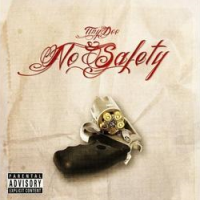Music Is Not a Crime: Judge Tosses Gang Charges Against Rapper
 Brandon Duncan's CD
Brandon Duncan's CD
Brandon Duncan may have to face the music and give an account of his life growing up on the streets of a crime-infested San Diego neighborhood, but it won’t be in a courtroom this month.
San Diego County Superior Court Judge Louis Hanoian dismissed conspiracy charges against the rapper, also known as Tiny Doo, in a case that sought to innovatively use a state law to establish a connection between music and gang behavior. Charges were also dropped against a co-defendant, Aaron Harvey, who was accused of a connection to a violent street gang through social media.
Prosecutors said he flashed gang signs on Facebook. They both faced potential life in prison although the district attorney did not seek to directly connect them to a crime.
Duncan recorded music with nasty lyrics for a CD featuring a gun and bullets on the cover. He also posed on social media websites with friends who were implicated in a 2013-14 crime spree that included nine shootings. Duncan and 14 others were arrested last year in a crime sweep, but according to the Los Angeles Times, the case came to embrace 33 defendants.
Twelve pleaded guilty to charges that included attempted murder, robbery, possession of firearms and conspiracy to commit violence. The judge said the district attorney had no business including Duncan and Harvey in that group.
Duncan was charged under provisions of Proposition 21, passed by voters in 2000. The law allows the authorities to prosecute gang members who profit from crimes of other gang members, even if they aren’t directly involved. Duncan’s record sales, career and stature in the community were said to get a boost from the gang’s activities.
He told Buzzfeed he had 100 CDs pressed and gave them away to friends and family. The law also increased the sentences for gang-related crimes and prescribed jail time for relatively minor offenses if they were gang-related.
Duncan grew up with a number of those arrested and reportedly has the gang moniker of “TD.” The Los Angeles Times said he was arrested in 2008 and charged with pimping and pandering. Charges were eventually dropped.
The law applied to Duncan and Harvey states: “Any person who actively participates in any criminal street gang . . . with knowledge that its members engage in or have engaged in a pattern of criminal gang activity . . . and who willfully promotes, furthers, assists, or benefits from any felonious criminal conduct by members of that gang is guilty of conspiracy to commit that felony.”
D.A. spokesperson Tanya Sierra said in a statement:
“It’s unfortunate that in spite of the evidence transparently available in the court record and court’s rulings that clearly establish their active gang membership during the time of the shootings, the media and community has allowed itself to be manipulated by individuals who are misrepresenting their true level of gang involvement.”
Sara Libby at the Voice of San Diego said the San Diego district attorney wouldn’t be satisfied until inclusion in the CalGang database, which tracks members of targeted gangs by their descriptions, tattoos, criminal associates, locations, vehicles, criminal histories and activities, constituted grounds for charging someone with a crime.
–Ken Broder
To Learn More:
Judge Dismisses Gang Conspiracy Charges Against Rapper Tiny Doo (by R. Stickney, Steven Luke and Andie Adams, NBC San Diego)
Rapper Tiny Doo, Facing Life in Prison over Lyrics, Has Charges Dropped (by Claudia Koerner and Jim Dalrymple II, BuzzFeed)
Conspiracy Charges Dismissed Against Rapper and Facebook User Accused Under Obscure California Law (by Travis Gettys, Raw Story)
San Diego Judge Drops Charge Against Rap Singer in Gang Case (by Tony Perry, Los Angeles Times)
Rap Album Could Land San Diego Musician in Prison for Life (by Ken Broder, AllGov California)
Rap on Trial (by Charis E. Kubrin and Erik Nielson, Sage Journals)
- Top Stories
- Controversies
- Where is the Money Going?
- California and the Nation
- Appointments and Resignations
- Unusual News
- Latest News
- California Forbids U.S. Immigration Agents from Pretending to be Police
- California Lawmakers Urged to Strip “Self-Dealing” Tax Board of Its Duties
- Big Oil’s Grip on California
- Santa Cruz Police See Homeland Security Betrayal in Use of Gang Roundup as Cover for Immigration Raid
- Oil Companies Face Deadline to Stop Polluting California Groundwater





